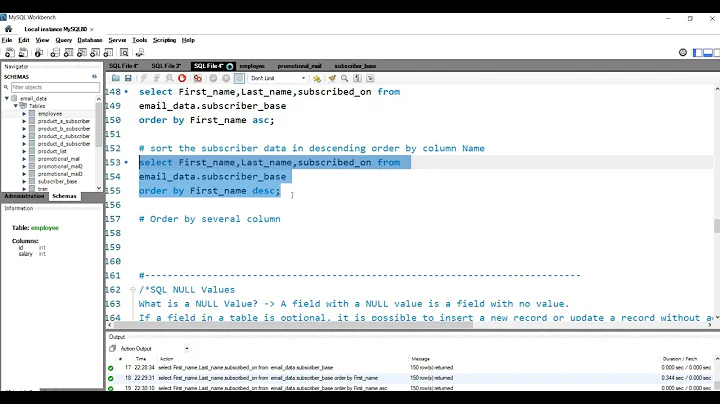ascending or descending order according to boolean column
I don't think bc=true desc, bc=false asc is working good. I'll check again when I have my computer and update my answer later.
Maybe my solutions is just a trick or a cheat. This is not a legal way. You can try this.
SELECT * FROM test
ORDER BY bc DESC, CASE WHEN bc THEN date*(-1) ELSE date END ASC;
Or
SELECT * FROM test
ORDER BY bc DESC, CASE WHEN bc THEN abs(date) ELSE date END ASC;
Hopefully my answer will satisfy you.
Related videos on Youtube
codebot
Updated on June 04, 2022Comments
-
codebot about 2 years
This is the table structure in PostgreSQL 10.

Even though "date" is an
int, it represents a yyyy mm dd date. I am trying to write aSELECTthat orders by date and when it is BC=true it isdesc, so dates will be in the right order -500 01 02 then -500 01 03 (yyyy mm dd)
and when is is BC=false it isasc, so dates will be in the right order again 1500 01 02, then 150 01 03 (yyyy mm dd)I came up with this
SELECT * FROM test ORDER BY bc=true desc, bc=false asc;that does great on BC dates, but it flips the AD dates (15000103 then 15000102, that is wrong).I know there is the
datetype available, but I want this to work as a hack for exact BC dates.How can I change my
SELECTto properly order the dates according to the BC boolean column?Thanks
-
 Vao Tsun over 6 yearsneat solution, especially given the time to responce
Vao Tsun over 6 yearsneat solution, especially given the time to responce -
codebot over 6 yearsAre you multiplying the whole date column by -1 ? I am trying for something like pseudocode :
SELECT * FROM test ORDER BY date IF bc=true THEN desc ELSE asc;but I keep getting syntax errors, no matter what I try -
codebot over 6 yearsAh, very smart soluton, but, lets say I have
-5000102and5000102and doSELECT * FROM test ORDER BY abs(date), bc desc;, I get-5000102 5000102 -5000103 5000103, so again, no. If the table had those exact fixed values, then yes, but the table could have any value -
codebot over 6 yearsbtw, it works, I just think that is strange to multiply everything with -1. What if I had 20.000 rows? I am just trying to syntax something purely based on order. But I keep getting errors. I tried nested select, union...Nothing works. This is killing me
-
codebot over 6 yearsCheck my answer if you like. The difference with my solution is that I dont use
*(-1). I am no expert to tell if any of the solutions, is better or worst, but I am suggesting another solution. Thanks -
codebot over 6 yearsThanks for the answer. The problem is that if you add another date like
-5000102they will not order properly. Plus, the union does not guarantee the proper order of both results, the comments in the other question are right. So, check my answer if you like, I came up with another solution. -
 Mabu Kloesen over 6 yearsSo sorry, I'm out of my computer since yesterday. For your answer, no it is not multiply with (-1) for all data, only the data with bc = true, I've already put it in
Mabu Kloesen over 6 yearsSo sorry, I'm out of my computer since yesterday. For your answer, no it is not multiply with (-1) for all data, only the data with bc = true, I've already put it inCASE WHENphase. Or you can replacedate*(-1)withabs(date)as suggestion of @VaoTsun in the answer below. From my experience, PostgreSQL do not have condition inOrdering, you must pre-process the data first then sort it by ASC or DESC as you want. -
 Mabu Kloesen over 6 yearsYes, it's work. But I have some worried, because with this case, it will check for 4 conditions and then sort 4 times. I don't think it will be good if the data is larges. BTW, you can try it. Besides, we can talk more about this case, with
Mabu Kloesen over 6 yearsYes, it's work. But I have some worried, because with this case, it will check for 4 conditions and then sort 4 times. I don't think it will be good if the data is larges. BTW, you can try it. Besides, we can talk more about this case, withCasephase, if you don't define theelsephase, it will benulland happily the default ofASCisnulls last, and vice versa forDESC. You can check more aboutQuery Orderhere postgresql.org/docs/10/static/queries-order.html -
 Mabu Kloesen over 6 years@codebot: I think he want to show another way to combine with my answer above. From that the query will be:
Mabu Kloesen over 6 years@codebot: I think he want to show another way to combine with my answer above. From that the query will be:SELECT * FROM test ORDER BY bc DESC, CASE WHEN bc THEN abs(date) ELSE date END ASC;




